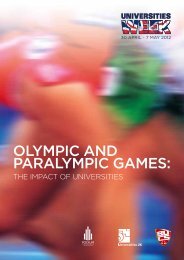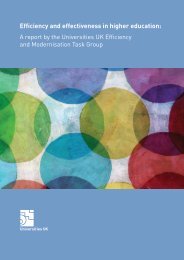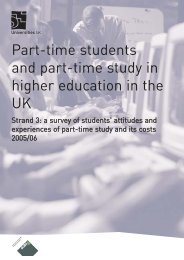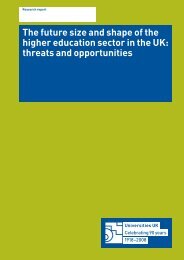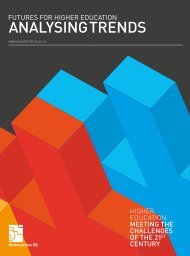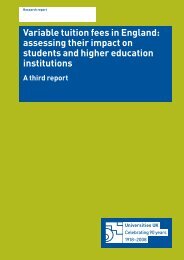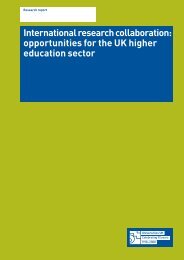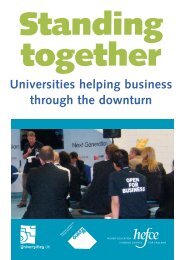The future of research - Universities UK
The future of research - Universities UK
The future of research - Universities UK
Create successful ePaper yourself
Turn your PDF publications into a flip-book with our unique Google optimized e-Paper software.
<strong>Universities</strong> <strong>UK</strong> – <strong>The</strong> <strong>future</strong> <strong>of</strong> <strong>research</strong><br />
15<br />
Not all <strong>research</strong> is <strong>of</strong> high quality but trawling money risks a deleterious effect on<br />
morale with little benefit. A shift <strong>of</strong> significant resources from the centre would be<br />
deleterious because it would undermine <strong>research</strong> that is well above world average<br />
without producing an equivalent top-end gain. However, for the <strong>research</strong> system as<br />
a whole, the objective in times <strong>of</strong> scarcity must be to sustain the contribution at the<br />
highest level and avoid irreparable damage to the national pr<strong>of</strong>ile.<br />
How can this be achieved? One option is to invest substantial<br />
resources in collaborative programmes which concentrate resources in a smaller<br />
number <strong>of</strong> leading departments by engaging and entraining joint ventures with<br />
other departments. This would need to be organised on a regional basis to avoid<br />
the deterrent <strong>of</strong> distance. <strong>The</strong> Great Western Research project involves <strong>research</strong><br />
teams in 13 HEIs across South West England. Research pooling arrangements in<br />
Scotland, supported by the Scottish Funding Council, span a range <strong>of</strong> disciplines<br />
and enable the sharing <strong>of</strong> facilities and equipment, as well as joint doctoral training<br />
programmes. <strong>The</strong>se are examples <strong>of</strong> structured and managed collaboration as<br />
a route to maintaining networks <strong>of</strong> <strong>research</strong> competence.<br />
Another – or potentially parallel – option is to consider whether<br />
policies that have overtly differential effects and benefits, generally avoided in<br />
a unitary system, may have a role. For example, it may be desirable to introduce<br />
capacity thresholds, such as a minimum <strong>of</strong> eight active <strong>research</strong>ers in a unit or<br />
some minimum <strong>of</strong> excellence – although the optimum size may vary between<br />
subjects. About 2,400 units across universities and subjects were submitted to<br />
RAE2008. Fewer than ten <strong>of</strong> these units had as much as 10 per cent <strong>of</strong> activity rated<br />
at the high-end 4* and yet also had 75 per cent or more rated at the low-end <strong>of</strong> 2*<br />
or below. In other words, islands <strong>of</strong> excellence are rarely associated with pools<br />
<strong>of</strong> mediocrity. However, there were 350 units that had just five per cent at 4* and<br />
25 per cent or more above 2*. Some 500 units had both five per cent or less at 4*<br />
and less than 25 per cent above 2*. In other words, if we applied a performance<br />
threshold that required a minimum <strong>of</strong> 10 per cent at 4* and 25 per cent at 3* or<br />
above, below which core QR funding would not be triggered, then this would<br />
remove one-fifth <strong>of</strong> all units from the <strong>research</strong> pot.<br />
Recommendations<br />
Rec 9 <strong>The</strong> system needs to be stringent in building on TRAC to achieve<br />
sustainability. <strong>Universities</strong> should exercise greater oversight to ensure that<br />
investigators avoid taking on contracts that are not properly resourced.<br />
Investigators need to accept that they are project managers and must work to<br />
scope and cost projects more fully and then to work within resources. This echoes<br />
the 2010 report <strong>of</strong> the Research Councils <strong>UK</strong> (RC<strong>UK</strong>)/<strong>Universities</strong> <strong>UK</strong> task group<br />
chaired by Sir William Wakeham 4 on financial sustainability and efficiency, which<br />
states that ‘it is not clear that institutions are actually using the metrics [provided<br />
by TRAC] as effectively as they might’ and concludes ‘that the use <strong>of</strong> metrics to<br />
analyse trends, can and should be improved.’<br />
Rec 10 Research Councils should consider resource ‘packets’ across the system,<br />
in a constructive way that reduces the lower value margin while enhancing<br />
the rest. For example, there could be fewer but better funded studentships to<br />
encourage high-quality candidates. Numbers <strong>of</strong> grant awards could be reduced,<br />
while <strong>research</strong> contracts must be properly costed and then fully funded. <strong>The</strong> HE<br />
<strong>research</strong> base can <strong>of</strong>fer this as support <strong>of</strong> quality over quantity.<br />
Rec 11 Funding Councils should reflect on the options for a ‘minimum level <strong>of</strong><br />
capacity’ in <strong>research</strong> activity. This is not about the relationship between scale and<br />
outcome but about true ‘critical mass’. However, balancing arrangements must be<br />
put in place to sustain the pervasive network <strong>of</strong> <strong>research</strong> activity that enables the<br />
<strong>UK</strong> to be both competitive and flexible in responding to challenges.



